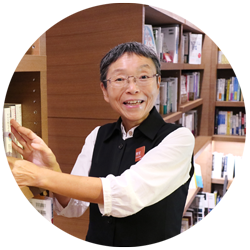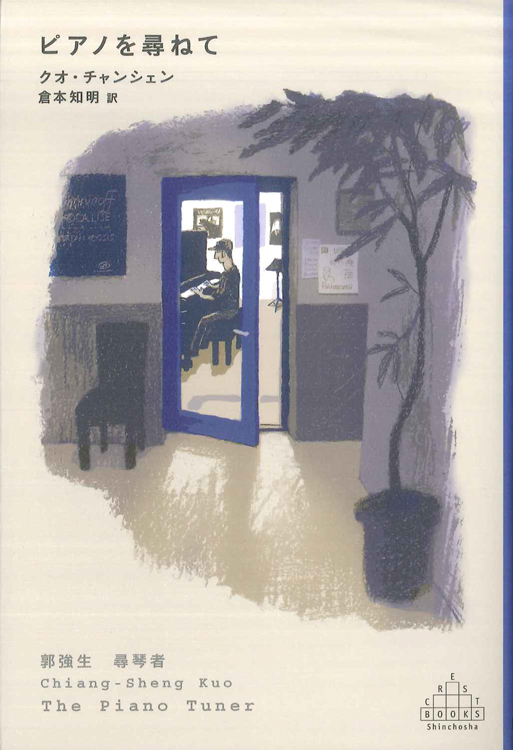[No. 292] Michiko Mamuro's bookshelf "In Search of the Piano" by Kuo Changsheng, translated by Tomoaki Kuramoto, published by Shinchosha
Known as the "original charismatic bookseller," DAIKANYAMA TSUTAYA BOOKS, who recommends books in a variety of media including magazines and TV.
In this series, we take a peek into the "bookshelves" in the mind of our most popular concierge.
Please enjoy it along with his comments.
* * * * * * * *
Ask the Piano
Kuo Chang-Sheng, translated by Tomoaki Kuramoto, published by Shinchosha
Click on the image to go to the purchase page.
Click on the image to go to the purchase page.
* * * * * * * *
The story is set in Taiwan. The first person to appear is Lin San, who is in his mid-fifties and has remarried to Emily, who is twenty years younger than him. He is a successful businessman with a tall build and beautiful silver hair. His favorite car is a Ferrari. (The family of this man, who is called "Lin San," seems to have some connection to Japan, although the details are not given in the story.)
Emily is a musician, and Hayashi-san, who has few friends, was expected to have a culturally glorious old age. However, she dies of illness in the fourth year of their marriage. Hayashi-san is over 60. Everything is empty, including the music school she had opened and the Steinway piano (worth about 13.5 million yen!) he bought for his home.
When he decided to close the school and was wondering what to do with the pianos, "I" appeared before him. A former genius pianist. Now in his forties. A man who had given up.
A late wife, a lonely and wealthy man, and a piano tuner whose dreams have been shattered. The story progresses as the three people become intertwined, and episodes of famous composers and performers such as Rahmaninoff, Gould, Richter, and Schubert are sprinkled in. The one line by the great composer Richter that I found symbolic is:
In his later years, when an interviewer in a documentary film about himself asked Richter, "What kind of piano do you want to play?" Richter replied simply:
"I never get what I want"
Emily, Hayashi-san, and "I" have both experienced unrest in life, but rather than being a constant source of hardship, I believe we have also had many lucky experiences.
Take "I," for example. A father who runs a gyoza restaurant and has raised five children, scoffs when his elementary school music teacher tells him, "Your son has a talent for the piano." But "I" had this teacher. She gave me lessons for free and used her own money to make it possible for me to become a student of my tutor in college. But...
Meanwhile, Emily. Although she had been accepted into a scholarship class and studied abroad, her musical career had not been outstanding, and she was at an age where she thought she could not wait any longer to get married. However, she met Hayashi-san, and on their first wedding anniversary, he sponsored her to hold a solo concert. However,
Once again, Professor Tei and I. When she found out that one of her students had stopped playing the piano, she introduced me to a pianist who had made a name for himself overseas. Things went well between the now 17-year-old me and this man, who had returned to Taiwan to rest both body and mind. Then, one day, he made a dream proposal to me when he suddenly decided to give a concert. But...
And so, Hayashi-san married a beautiful young academic wife. However, he learns that the late Emily was dissatisfied with the sound of the Steinway. If this is how it is with a top-of-the-line piano, what else could his wife have been hiding? Although their marriage ended with her death, minor discrepancies are revealed.
Things and events that we can never obtain bring despair and resignation, but love, opportunities, and ideals come to us and we reach out and they are there! However, what if we were to realize that the closest we came to them was actually when we missed them? People will become attached, distort themselves, and suffer from loneliness. It is because we have feelings that we "never have what we want."
Music novels are often praised for "reading the text, but hearing the music as if listening to it," but I enjoyed this book as a "point-of-view story." "There are unexpected similarities between the narrator of the story and the job of a piano tuner," says "I." And a recuperating pianist says, "The best part of Richter's performance is the short silences between the notes."
Even after you finish reading, you will be left with mysteries about each character, such as "Is this true?", "Which is it?", and "What else is there?" Listen carefully and think about their untold lives.
Emily is a musician, and Hayashi-san, who has few friends, was expected to have a culturally glorious old age. However, she dies of illness in the fourth year of their marriage. Hayashi-san is over 60. Everything is empty, including the music school she had opened and the Steinway piano (worth about 13.5 million yen!) he bought for his home.
When he decided to close the school and was wondering what to do with the pianos, "I" appeared before him. A former genius pianist. Now in his forties. A man who had given up.
A late wife, a lonely and wealthy man, and a piano tuner whose dreams have been shattered. The story progresses as the three people become intertwined, and episodes of famous composers and performers such as Rahmaninoff, Gould, Richter, and Schubert are sprinkled in. The one line by the great composer Richter that I found symbolic is:
In his later years, when an interviewer in a documentary film about himself asked Richter, "What kind of piano do you want to play?" Richter replied simply:
"I never get what I want"
Emily, Hayashi-san, and "I" have both experienced unrest in life, but rather than being a constant source of hardship, I believe we have also had many lucky experiences.
Take "I," for example. A father who runs a gyoza restaurant and has raised five children, scoffs when his elementary school music teacher tells him, "Your son has a talent for the piano." But "I" had this teacher. She gave me lessons for free and used her own money to make it possible for me to become a student of my tutor in college. But...
Meanwhile, Emily. Although she had been accepted into a scholarship class and studied abroad, her musical career had not been outstanding, and she was at an age where she thought she could not wait any longer to get married. However, she met Hayashi-san, and on their first wedding anniversary, he sponsored her to hold a solo concert. However,
Once again, Professor Tei and I. When she found out that one of her students had stopped playing the piano, she introduced me to a pianist who had made a name for himself overseas. Things went well between the now 17-year-old me and this man, who had returned to Taiwan to rest both body and mind. Then, one day, he made a dream proposal to me when he suddenly decided to give a concert. But...
And so, Hayashi-san married a beautiful young academic wife. However, he learns that the late Emily was dissatisfied with the sound of the Steinway. If this is how it is with a top-of-the-line piano, what else could his wife have been hiding? Although their marriage ended with her death, minor discrepancies are revealed.
Things and events that we can never obtain bring despair and resignation, but love, opportunities, and ideals come to us and we reach out and they are there! However, what if we were to realize that the closest we came to them was actually when we missed them? People will become attached, distort themselves, and suffer from loneliness. It is because we have feelings that we "never have what we want."
Music novels are often praised for "reading the text, but hearing the music as if listening to it," but I enjoyed this book as a "point-of-view story." "There are unexpected similarities between the narrator of the story and the job of a piano tuner," says "I." And a recuperating pianist says, "The best part of Richter's performance is the short silences between the notes."
Even after you finish reading, you will be left with mysteries about each character, such as "Is this true?", "Which is it?", and "What else is there?" Listen carefully and think about their untold lives.
* * * * * * * *
(Redirects to Yahoo! Shopping)

DAIKANYAMA TSUTAYA BOOKS Literature Concierge
Michiko Mamuro
【profile】
"The original charismatic bookseller" who recommends books on various media such as radio and TV. Has serials in magazines such as "Precious" and "Fino". Active as a book critic, his paperback reviews include "The Pale Horse" (Agatha Christie/Hayakawa Christie Bunko), "Motherhood" (Minato Kanae/Shincho Bunko), "The Snake Moon" (Sakuragi Shino/Futaba Bunko), and "Staph" (Michio Shusuke/Bunshun Bunko).
























